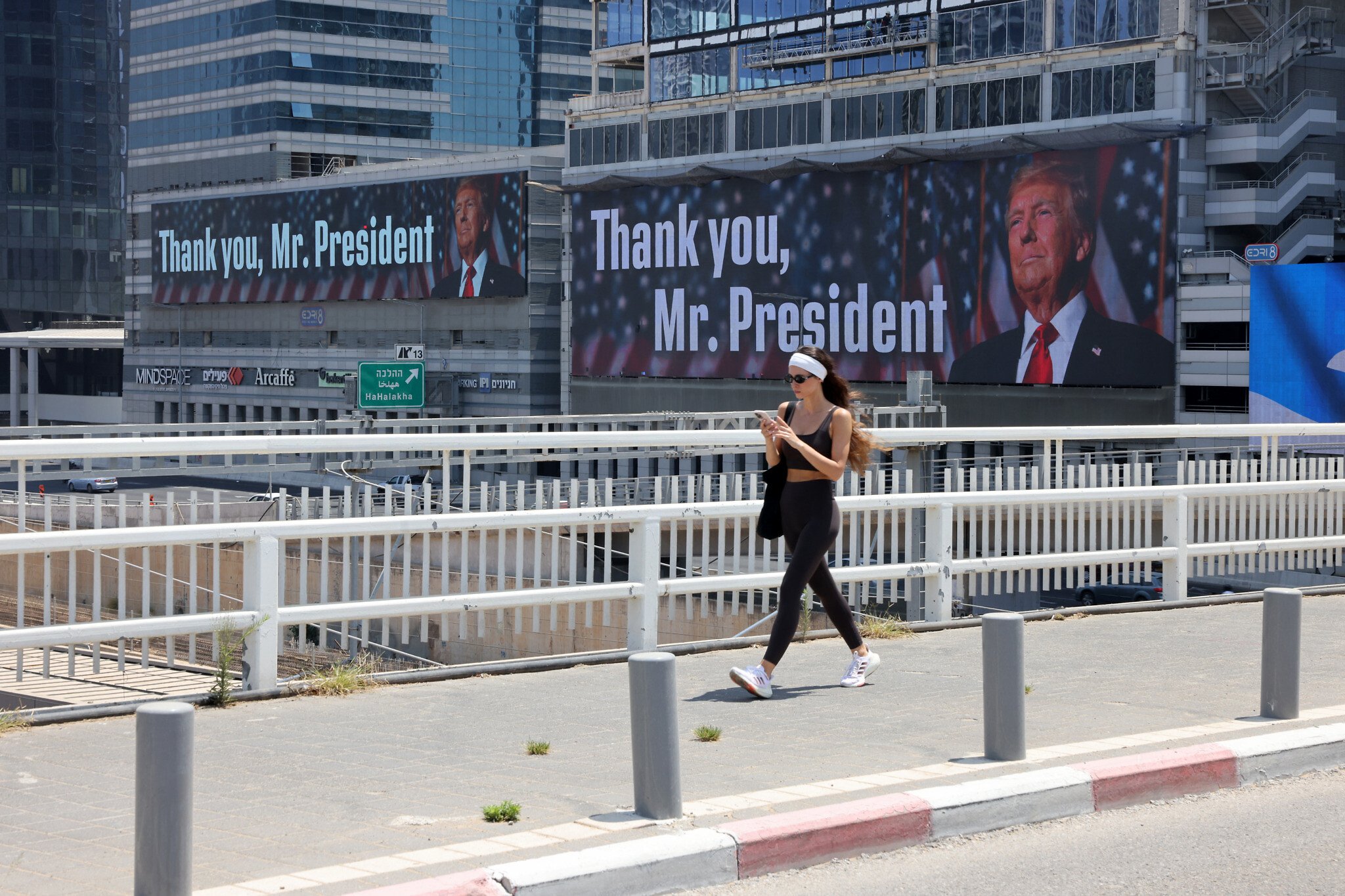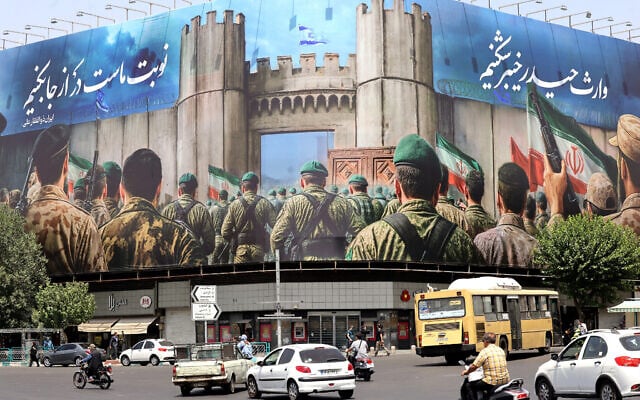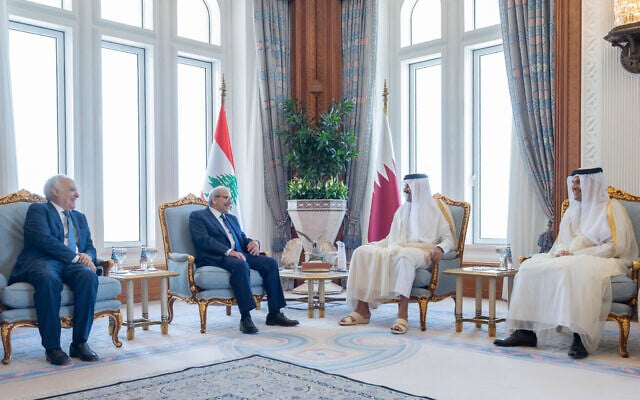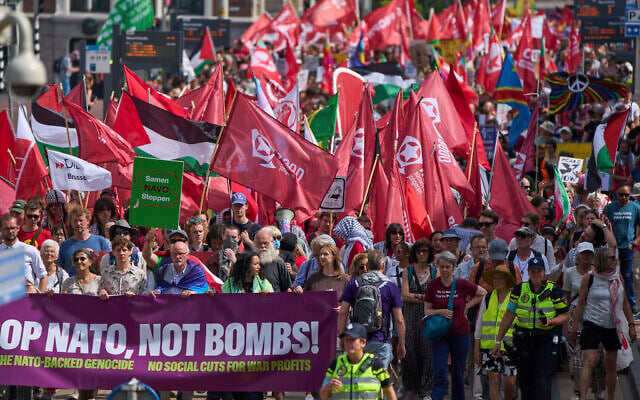



A fragile ceasefire between Israel and Iran appeared to be holding Tuesday after 12 days of war between the two countries, which saw Israel pummel the Islamic Republic’s nuclear program and Tehran launch hundreds of ballistic missiles in retaliation.
The truce got off to a shaky start after two missiles were launched at Israel by Iran at around 10:30 a.m., some three and a half hours after it came into effect. While Israel initially vowed to respond “forcefully” to the violation, it was persuaded to scale down its attack by US President Donald Trump, and instead struck only an Iranian radar north of Tehran.
The ceasefire, announced by Trump at 5:02 p.m. in Washington (1:02 a.m. Israel time) on Tuesday, was welcomed, albeit cautiously, by allies of both Jerusalem and Tehran. Many took the opportunity to call for Iran to return to the negotiating table to discuss its battered nuclear program and urge Israel to extend the ceasefire to Gaza and end the war that has been raging there since the deadly October 7, 2023, Hamas-led invasion of southern Israel.
The relief created by the truce was evident across the Middle East, where some countries have found themselves caught in the middle, wary of risking either their regional interests or their Western ones.
On Israel’s borders, Jordan, which has ties with Iran, and Egypt, which does not, welcomed the truce as an important development for regional stability, but demanded that diplomatic resolutions to regional conflict not end there.
“The ceasefire must hold. That is essential for saving the region from the horrific consequences of further escalation,” said Jordanian Foreign Minister Ayman Safadi, calling for Iran to resume the nuclear deal talks that were paused with the start of Israel’s campaign on June 13.
“But the region is still far from the comprehensive calm and the just peace it deserves,” Safadi cautioned. “Gaza must not be forgotten.”
He called for all parties to work toward a two-state solution between Israel and the Palestinians, starting with a permanent ceasefire in the Gaza Strip and the return of all remaining hostages abducted from Israel on October 7.
“Hope must be restored,” he said. “The region will continue to suffer from tension and instability unless the root cause of the conflict is solved.”
Egypt similarly stressed that the US-backed ceasefire was “a critical point to ending this conflict between both countries and restoring peace in the region,” and called on both countries to fully abide by it.
But like Jordan, the Egyptian foreign ministry reiterated its belief that the creation of a Palestinian state would be the only way to ensure “lasting security and stability in the region and beyond.”
In Ramallah, meanwhile, the Palestinian Authority welcomed the ceasefire but demanded that it be widened to include the Gaza Strip.
Further afield, the Gulf countries balanced their strategic ties with both Iran and the US as they welcomed the start of the truce between Israel and Iran.
Qatar, which has been mediating on-again off-again ceasefire efforts between Israel and Hamas for the past 20 months, warned Jerusalem not to “exploit” the truce with Iran by escalating in the Gaza Strip.
“We hope that the Israeli side will not exploit the ceasefire with Iran to unleash what it wants to unleash on Gaza and continue its bombing” of the Strip, said Sheikh Mohammed bin Abdulrahman Al-Thani during a joint press conference with his Lebanese counterpart.
He appeared similarly displeased with Iran, however, in light of the attack it had launched less than 24 hours earlier on the major US military base on Qatari soil, calling its actions “unacceptable.”
“What happened will definitely have its scar on the relationship (with Iran),” said al-Thani, “but I hope by the time everyone learns the lesson that this kind of neighborhood relationship should not be violated and should not be undermined.”
“The partnership between Qatar and the US is just growing stronger… and I hope the good relationship with Iran comes back to normal as soon as possible,” he said, adding that Qatar had liaised with Iran at Washington’s request to help facilitate the ceasefire.
He called for both the US and Iran to resume diplomatic efforts to forge a new nuclear deal.
The United Arab Emirates, meanwhile, congratulated Trump and the Qataris for clinching the truce, “stressed the importance of continued effective coordination to prevent further escalation,” while Saudi Arabia said it was “look[ing] forward to all parties committing to de-escalation in the coming period.”
In Europe, where NATO leaders were gathering in the Netherlands on Tuesday for a historic two-day summit, Israel’s allies emphasized the importance of taking the ceasefire forward and moving toward a diplomatic solution to ensure Iran’s nuclear capabilities were truly neutered.
French President Emmanuel Macron said it was a “very good thing that President Trump is calling for a ceasefire,” but warned that “the situation remains very fragile.”
German Chancellor Friedrich Merz urged both sides to adhere to the truce and to reach a new diplomatic agreement, calling it a “very positive development that can make the Middle East and the world safer.”
“Not only Israel, but also Europe and the world as a whole are threatened by this Iranian nuclear program,” Merz told lawmakers ahead of his departure for The Hague.
Russia, often at odds with its fellow Europeans, also welcomed the ceasefire, with Kremlin spokesman Dmitry Peskov saying that a ceasefire “can only be welcomed.”
He said Russia hoped “that this will be a sustainable ceasefire.”
NATO Secretary General Mark Rutte also took the opportunity to thank Trump for his “decisive action” in Iran, where the US had struck three Iranian nuclear sites early Sunday. It was “truly extraordinary and something no one else dared to do,” he said.
Israel said its 12-day sweeping assault on Iran’s top military leaders, nuclear scientists, uranium enrichment sites, and ballistic missile program was necessary to prevent the Islamic Republic from realizing its avowed plan to destroy the Jewish state.
Iran, which avowedly seeks Israel’s destruction, has consistently denied seeking to acquire nuclear weapons. However, it has enriched uranium to levels that have no peaceful application, has obstructed international inspectors from checking its nuclear facilities, and expanded its ballistic missile capabilities. Israel said it had recently taken steps toward weaponization.
Iran retaliated to Israel’s attacks by launching some 550 ballistic missiles and around 1,000 drones at Israel, killing 28 people and wounding thousands more, according to health officials and hospitals.
Some of the missiles hit apartment buildings, a university and a hospital, causing heavy damage.



